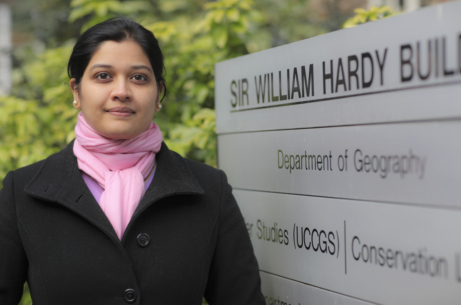
Rohini Chaturvedi is studying the trade-offs behind conservation policy in India.
How do environmental policies get made? What is the trade-off in fast developing countries like India between conservation and economic growth? What role does coalition politics have?
Rohini Chaturvedi [2007] is looking at how a complex country like India makes policy so that she can understand better what the key factors are for promoting conservation.
She has long been interested in how different issues impact on the Indian ecology and particularly in how humans interact with their natural environment.
“There are very few studies looking at how environmental policies get made in India,” she says. She has been looking at the literature on forestry. None of it was focused on who was making the decisions and how those decisions got taken.
She adds that there is a lot of research on coalition politics, given that India has had a coalition government since 1996. However, says Rohini, none of the research looked at how coalition politics influences policy making. Her research is a longitudinal study of how coalition politics and the federal government system impacts on forestry policy. “I am interested in the kind of trade-offs that occur between strong conservation interests and the impetus for fast economic growth and how the changing political economy influences what goes on in forestry,” she says.
Rohini grew up in the city of Pune, the cultural capital of Maharashtra, which is situated close to an area which is rich in biodiversity and has an active environmental movement and a long history of conservation. It is bustling with active citizens’ groups, including ones which focus on wildlife and ecology. Its proximity to Western Ghats and its large bird population makes it a birdwatcher’s dream and Pune hosts a very active bird watchers club as well as an environment camp for children.
Rohini says the ecological culture of the city was an inspiration and she has combined her enthusiasm for active environmentalism with her academic interests.
University
Rohini, who comes from an academic family which emphasised reading and debate, studied psychology at the University of Pune. She says she was drawn to it as psychological theory offered a set of skills which were useful for any field with a social dimension. Because it was about engaging with people, it helped her to be more perceptive. She says she would have taken her interest in psychology further if it had not been for her growing interest in the environment.
She became involved in an environmental camp for children while she was at the University of Pune. This involved helping children to become more environmentally aware through games and other activities. The camp gave her the opportunity to interact with experts in diverse fields, ranging from botany to anthropology. These interactions left her eager to learn more about the links between natural resources, how people live and work and economic development.
At the time – over 10 years ago – there were very few viable options for inter-disciplinary studies in conservation in India, especially in jobs dealing with the impact of humans on the environment. Rohini says: “The environment was viewed as a scientific subject for which you need a pure science background.”
In 2003, she discovered the Indian Institute of Forest Management which was unique in South Asia and accepted students from a wide variety of backgrounds to do a postgraduate diploma in Forestry Management.
After finishing the course she started work on a series of assignments. One of them was a participatory forest management project run in partnership with various institutions, including the the University of Cambridge. The aim was to study what different stakeholders’ views were about forest management. Very polarised views were revealed. Some stakeholders were all in favour of forest management while others felt it perpetuated existing inequalities.
Perspectives
Rohini spent a year looking at what shaped people’s different perspectives on environmental projects. She did not want to be linked to any particular project, preferring to explore different ways of approaching environmental issues, so she freelanced for a while, writing reports on a range of subjects and building a network of contacts. Then she was offered a job at the World Wildlife Fund in Delhi as part of a team working on forestry and biodiversity. She was looking at whether offering people payments would encourage them to act in a more sustainable way.
Rohini applied to the University of Cambridge to do an MPhil in Environment, Society and Development starting in 2007. She had been in contact with the University through the forestry management project and says it was doing the kind of work she was interested in . “I knew that by going there I would have the space to do what I wanted,” she says. “The MPhil programme was unique too as it offered multiple dimensions on conservation.”
It was also a very international course and gave her perspectives on what was happening worldwide. “It was a chance to reflect,” she says. She was interested in doing a PhD from the start, but, having been away from academia for a few years she needed to get back into the academic habit through doing an MPhil.
She was accepted the following year to do a PhD in Geography and hopes to finish by the summer.
After this Rohini, who has been teaching a module on international development at the University’s Institute of Continuing Education over the past two years, is keen to get involved in policy making, but true to her family roots she is determined to also keep one foot in academia.
Photo credit: Sir Cam












